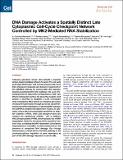DNA Damage Activates a Spatially Distinct Late Cytoplasmic Cell-Cycle Checkpoint Network Controlled by MK2-Mediated RNA Stabilization
Author(s)
Reinhardt, H. Christian; Hasskamp, Pia; Schmedding, Ingolf; Morandell, Sandra; van Vugt, Marcel A.T.M.; Wang, XiaoZhe; Linding, Rune; Ong, Shao-En; Weaver, David; Carr, Steven A.; Yaffe, Michael B; ... Show more Show less
DownloadYaffe_DNA damage.pdf (1.737Mb)
PUBLISHER_POLICY
Publisher Policy
Article is made available in accordance with the publisher's policy and may be subject to US copyright law. Please refer to the publisher's site for terms of use.
Terms of use
Metadata
Show full item recordAbstract
Following genotoxic stress, cells activate a complex kinase-based signaling network to arrest the cell cycle and initiate DNA repair. p53-defective tumor cells rewire their checkpoint response and become dependent on the p38/MK2 pathway for survival after DNA damage, despite a functional ATR-Chk1 pathway. We used functional genetics to dissect the contributions of Chk1 and MK2 to checkpoint control. We show that nuclear Chk1 activity is essential to establish a G2/M checkpoint, while cytoplasmic MK2 activity is critical for prolonged checkpoint maintenance through a process of posttranscriptional mRNA stabilization. Following DNA damage, the p38/MK2 complex relocalizes from nucleus to cytoplasm where MK2 phosphorylates hnRNPA0, to stabilize Gadd45α mRNA, while p38 phosphorylates and releases the translational inhibitor TIAR. In addition, MK2 phosphorylates PARN, blocking Gadd45α mRNA degradation. Gadd45α functions within a positive feedback loop, sustaining the MK2-dependent cytoplasmic sequestration of Cdc25B/C to block mitotic entry in the presence of unrepaired DNA damage. Our findings demonstrate a critical role for the MK2 pathway in the posttranscriptional regulation of gene expression as part of the DNA damage response in cancer cells.
Date issued
2010-10Department
Massachusetts Institute of Technology. Cell Decision Process Center; Massachusetts Institute of Technology. Department of Biological Engineering; Massachusetts Institute of Technology. Department of Biology; Koch Institute for Integrative Cancer Research at MITJournal
Molecular Cell
Publisher
Elsevier B.V.
Citation
Reinhardt, H. Christian, Pia Hasskamp, Ingolf Schmedding, Sandra Morandell, Marcel A.T.M. van Vugt, XiaoZhe Wang, Rune Linding, et al. “DNA Damage Activates a Spatially Distinct Late Cytoplasmic Cell-Cycle Checkpoint Network Controlled by MK2-Mediated RNA Stabilization.” Molecular Cell 40, no. 1 (October 2010): 34–49.© 2010 Elsevier Inc.
Version: Final published version
ISSN
10972765